Last September, Dean Ira Solomon brought together a diverse group of Freeman School stakeholders — including faculty members, staff members, students, alumni, members of the Business School Council, and representatives from the Freeman and Tulane administrations — and tasked them with developing a new strategic plan for the business school. With financial support from Ernst & Young, professional facilitation from a highly respected educational consulting firm, and participation from more than 50 members of the Freeman community, the effort was the most rigorous strategic planning process in school history.
In April, Dean Solomon formally unveiled the results of that process, the Freeman School’s first comprehensive strategic plan in more than five years. The 10-page document, which is available on the Freeman School’s website, defines the mission, values and goals of the school, and offers a clear, concise vision for the future, one built squarely on the notion of a virtuous cycle of continuous improvement.
Freeman magazine recently sat down with Dean Solomon to talk about the strategic plan and what it means for the Freeman School and its stakeholders.
FIRST OF ALL, WHY IS IT SO IMPORTANT AT THIS PARTICULAR TIME TO HAVE A NEW STRATEGIC PLAN?
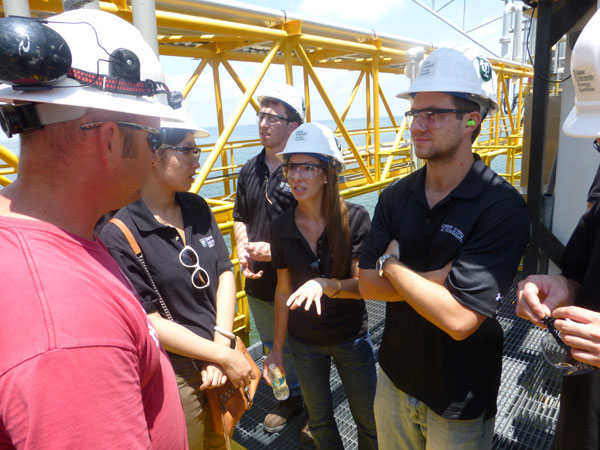
Master of Management in Energy students visit Breton Sound 51, an offshore production facility in the Gulf of Mexico. Energy is one of the key focus areas identified in the strategic plan.
There are several reasons, but first and foremost Freeman needed a new strategic plan because the demand for business education is in a period of rapid and major transition. Over the last several years, we’ve seen a large increase in demand for undergraduate education and one-year technical master’s programs like the Master of Finance and Master of Accounting. Much of the demand for those one-year programs is coming from Asia. At the same time, we’ve seen a falloff in demand for the two-year full-time MBA program, traditionally the flagship graduate program for most business schools. These enrollment trends are not unique to the Freeman School by any stretch. Business schools across the country are seeing similar demand changes due in part to recent economic conditions, but they nonetheless create fundamental challenges to the way we’ve traditionally done business. In addition, we’re also seeing increased competition on a global scale and advances in technology with the potential to transform the way we deliver programs. Taken as a whole, these changes have dramatically altered the business education playing field. If the Freeman School truly aspires to be a world-class educational institution, we simply can’t just keep doing what we’ve been doing. A second reason is that it’s been a long time—more than five years—since we last paused from our day-to-day operations to discuss the changes taking place in higher education and how we might best move forward. Related, with Tulane currently in the process of launching a university-wide strategic planning initiative, this was the time to chart our course and ensure that our thinking is represented in the university’s plan.
TALK A LITTLE ABOUT THE PROCESS THROUGH WHICH THIS PLAN WAS DEVELOPED.
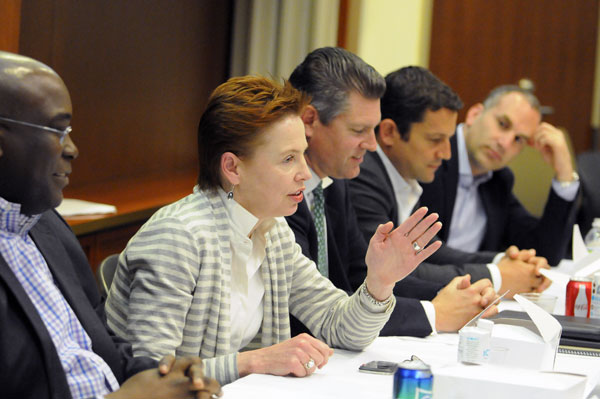
Ti Martin (MBA ’84), president of Commander’s Palace, speaks at last year’s Tulane Business Plan Competition luncheon. The strategic plan calls for developing pilot programs in hospitality and entrepreneurship.
What stands out to me most about the process was how inclusive it was. We had in excess of 50 people on our strategic planning team, representing all of the major stakeholder groups. The external consultants we engaged informed us that this was the largest planning group they’d ever worked with. They’re used to working with groups of about 30 people, but we had such a groundswell of interest from so many individuals when we announced the process, I decided that the sage approach would be to invite most everyone who expressed a desire to participate. With a strategic planning group that large, you’re covering most of your bases but not all of them, so another important element was to provide opportunities for others to have a voice in the process. We did that by making liberal use of the Internet. In February, we published a website with a draft of the plan and invited people to comment and offer suggestions. We also hosted a number of coffee hours and town hall meetings to enable faculty, staff, students and alumni to ask questions and discuss the plan. The feedback we received made this a stronger plan than it would have been otherwise. So on the whole I’m very happy with the process and how it played out, and I’m especially grateful to the members of our Strategic Planning Leadership Team. They demonstrated extraordinary dedication throughout the process, and the result is a robust, creative plan that truly represents the best ideas from our community.
THE STRATEGIC PLAN BEGINS WITH A NEW MISSION STATEMENT: “WE INSPIRE, ENGAGE AND ENABLE STUDENTS, ORGANIZATIONS AND OUR GLOBAL BUSINESS COMMUNITY TO CONTRIBUTE TO HUMAN ACHIEVEMENT AND PROSPERITY BY CREATING AND DISSEMINATING HIGH- IMPACT BUSINESS KNOWLEDGE AND BY LEVERAGING THE EXPERIENCES THAT NEW ORLEANS AND TULANE PROVIDE.”
WHY WAS IT NECESSARY TO WRITE A NEW MISSION STATEMENT AND WHAT DOES THE MISSION STATEMENT SAY ABOUT THE SCHOOL’S STRATEGY?
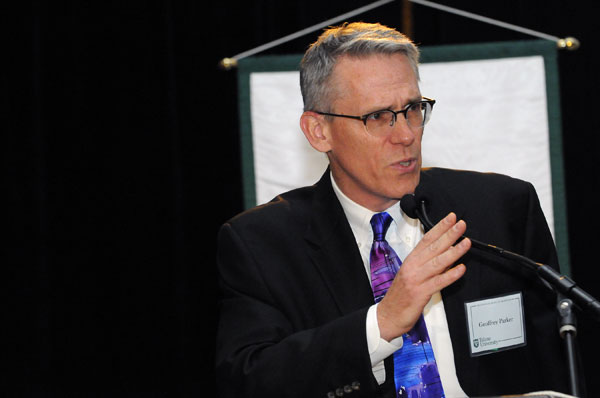
Geoff Parker, professor of management science, chairs the MBA Task Force, which is developing a new strategic plan for the MBA program in coordination with the school’s overall strategic plan.
One of the things I did early in this process was to look at close to 100 business school mission statements, and I was surprised to discover that the vast majority of them are fairly generic. The modal business school mission statement is basically, “We’re going to do high-quality research, and we’re going to deliver high-quality teaching.” That’s pretty much it. They could fit almost any business school. If you look at our new mission statement, you can’t help but know that it’s Tulane because we specifically mention Tulane and New Orleans. That wasn’t an accident. We want people who see our mission statement to immediately get a sense of who we are. So that’s one thing. But the second thing is—and I think this is a very important part of the mission statement—we talk about more than simply delivering high-quality teaching and producing state-of-the-art research. We characterize both of those goals as a means to a greater end, and that greater end is the impact we hope to have on human achievement and prosperity. We want people to understand that a Freeman School education prepares students to make a difference, and we consider doing so to be part of our DNA. So in that context, our reference to Tulane and New Orleans isn’t just to be unique. It’s because we believe that by associating our aspirations with this very special university and this very special city, people will be more likely to think along the lines of service and impact.
A CENTRAL THEME OF THE PLAN IS THE IDEA OF CREATING A VIRTUOUS CYCLE AT THE FREEMAN SCHOOL. WHAT EXACTLY IS A VIRTUOUS CYCLE? WHAT MIGHT ONE LOOK LIKE AT THE FREEMAN SCHOOL?
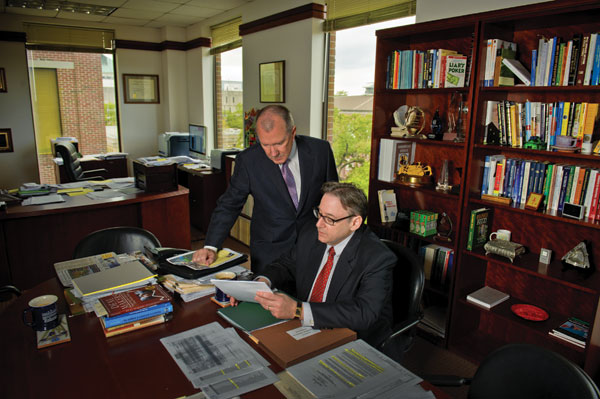
Dean Ira Solomon, seated, with Senior Associate Dean Paul Spindt. Dean Solomon says the Freeman School’s emphasis on generating a virtuous cycle is unique among business school strategic plans.
A virtuous cycle exists when a change in a system leads to a cascading series of follow-on benefits that reinforce themselves and add positively to the original change via reinforcing loops. That concept is really at the very heart of our strategic plan. If we’re successful in implementing the strategies in the plan, the benefits generated will fuel additional benefits that will in turn fuel even more benefits. For example, education and the development of a first-class curriculum is very important, but it’s only a part of what we should be doing. We also need to ensure that our programs are connected and up to speed with what’s happening in the business world. One way to do that is to partner with leading organizations in each industry and solicit their input. By making those connections, we strengthen our educational offerings, but another benefit is that if an organization feels that it’s had substantive input into the educational experience, that organization will be more likely to hire our graduates. That in turn will help us attract even better students and corporate partners. Another critical component of our mission is producing high-impact research. By connecting with these partner organizations, our faculty can learn more about problems in the industry and produce research that helps to solve some of these problems. So our faculty is able to produce high-impact research and the organizations feel an even closer connection to the school by having been exposed to this highly relevant research. By partnering with more organizations, therefore, we’re able to create a positive loop that touches on almost every aspect of what we do. That’s just one example.
TALK A LITTLE ABOUT THE PLAN AS A WHOLE. WHAT IN YOUR MIND ARE ITS HIGHLIGHTS?
This may sound funny, but to me one of the key outcomes of the strategic planning process was the recognition that we as a school need to be strategic. The realization that the world is changing around us and we can’t simply keep doing what we’ve been doing was extremely important. But equally important was its corollary: We don’t have the scale to do everything, so we have to be selective. And if we accept that premise, the question then becomes how do we decide what to do and what not to do.
Given the kind of business school we aspire to be, it quickly became clear to us that excellence, or the ability to achieve excellence, was one determinant. Another fundamental theme that developed was the importance of leveraging synergies and connecting with entities that can help us achieve excellence. A third idea that emerged and one that sort of ties everything together is the notion of continuous improvement and innovation. We need to continually look for ways to achieve our goals more efficiently and more effectively in order to ensure our sustainability. Given those three fundamental goals—the pursuit of excellence, leveraging synergies and continuous improvement—a number of programs come to mind. Our initiatives in entrepreneurship, finance, energy and accounting each embody those ideas, so those are four areas we plan to continue investing in and developing new and better programs.
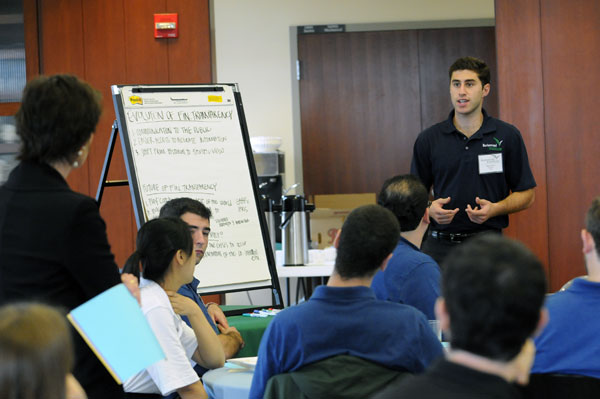
Matt Baron (BSM’13) participates in the Burkenroad Symposium workshop. An emphasis on providing innovative educational experiences for students runs throughout the strategic plan.
In addition to those areas, we also identified three areas with the potential to become true centers of excellence: hospitality, health care and K-12 education. Each one in its own way is a very logical step for us. For example, let’s take hospitality. New Orleans is known as a world-class center of hospitality, and many of our alums are very active in the hospitality space, using their entrepreneurial skills to create ventures in a variety of different domains. We intend to offer courses in hospitality with a focus on the entrepreneurial side of the business, and we hope to discover whether there’s sufficient demand for something more. These courses could comprise an MBA concentration or an undergraduate major, or they could form the heart of a one-year master’s program like the Master of Management in Energy. We don’t know yet. But hospitality is one area we’re going to investigate.
New Orleans also is becoming a regional center for healthcare delivery. Because of the pace of technological innovation in health care and the voracious regulatory environment that’s emerging, business skills in the healthcare arena are becoming more and more essential. We’re currently talking with Tulane School of Medicine about putting together a joint MD/MBA program that would go far beyond the current joint program we offer. This would be a full MBA program that medical students could complete in four years concurrently with their medical studies, and we think there could be significant interest in this in the coming years.
Thirdly, New Orleans has recently become a nationally recognized center for innovation in K-12 education, and many of the bright young individuals who came to New Orleans to help reform education are now taking on leadership roles in charter schools and other education-oriented initiatives. To effectively run these organizations, administrators need management skills, accounting skills, finance skills, even marketing skills, so we are thinking about offering an opportunity for people to earn an MBA with a concentration in the business of K-12 education. This MBA concentration could attract people who are here working in this space already, including those being supported by grants from the Gates Foundation or Teach for America, and we think it has the potential to attract educators from across the nation as well.
These are a few of the ideas that bubbled up during the strategic planning process. They’re just a part of the overall plan, but they’re indicative of the kind of innovative, entrepreneurial thinking found in the plan. We’re very much looking forward to implementing these initiatives along with the rest of the strategies in the plan.
WHEN WILL THE PLAN BE IMPLEMENTED AND HOW WILL YOU MEASURE ITS SUCCESS?
It’s already being implemented. In additional to longer-term goals and strategies, the plan includes a list of 10 strategic priorities to be implemented in the next one to three years. We are currently in the process of establishing faculty task forces to look at these priorities and develop implementation plans. Some are targeted for implementation in the next year, others may take a little longer, but we should be able to make measurable progress on all of them. At the same time, we’re going to be continually assessing the progress of the plan as a whole. For some strategies, we’ll use the usual metrics that business schools employ, such as how our development efforts are progressing or how many students we’re attracting. For others, we’re going to look at metrics that are a little less typical, for example how much of our budget is actually going to support key priorities, such as faculty research. The most difficult metrics will be the ones relating to our mission statement. When we say we want to have an impact, what does that mean? How do we quantify it? Well, for example, our Latin American Faculty Development Program has awarded 70 PhDs to business scholars in Latin America, which is more than any other U.S. business school. I would argue that that’s a significant impact, so that’s an example of the kind of metric we’re going to be using.
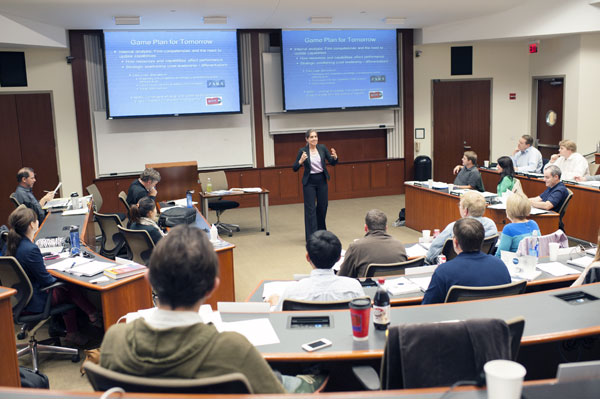
Associate Professor of Management Carmen Weigelt leads a New Orleans executive MBA class. Rebuilding and strengthening the Freeman School’s tenure-track faculty is a key component of school strategy.
IN CONCLUSION, WHAT CAN ALUMNI AND FRIENDS OF THE SCHOOL DO TO PARTICIPATE IN AND SUPPORT THE STRATEGIC PLAN?
The most salient way alumni can participate in and support the plan is simply by getting involved. During the next year, we’re going to be making a special effort to reach out to alumni and bring them into the fold. I’d encourage all alums to take advantage of these opportunities. Whether it’s Homecoming, the Tulane Business Forum or any other Freeman School event, you’ll be doing a great deal to support the plan simply by attending and becoming more connected. I’d also suggest that you read the plan and, if you like what you see, consider making a gift. A key element of what we’re trying to do is attract outstanding people to our Freeman educational programs, so a major focal point of our upcoming centennial celebration is going to be raising money for scholarships. But regardless of your preferences, we ask that you do become engaged. A more engaged alumni population is key to helping us grow, improve and achieve our goal to become one of the world’s premier institutions for business education.
To read the Freeman School’s strategic plan in its entirety, visit freeman.tulane.edu/strategicplan.

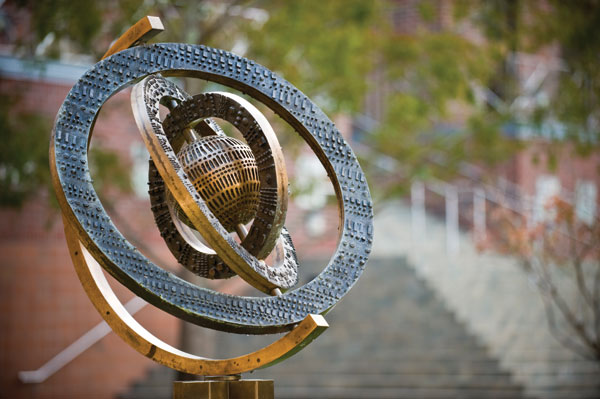
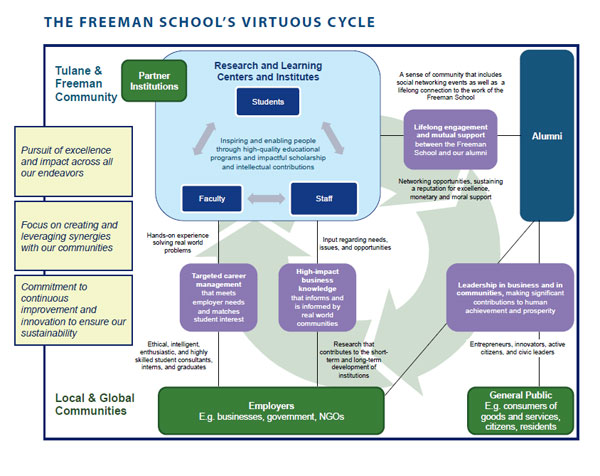


{ 0 comments… add one now }